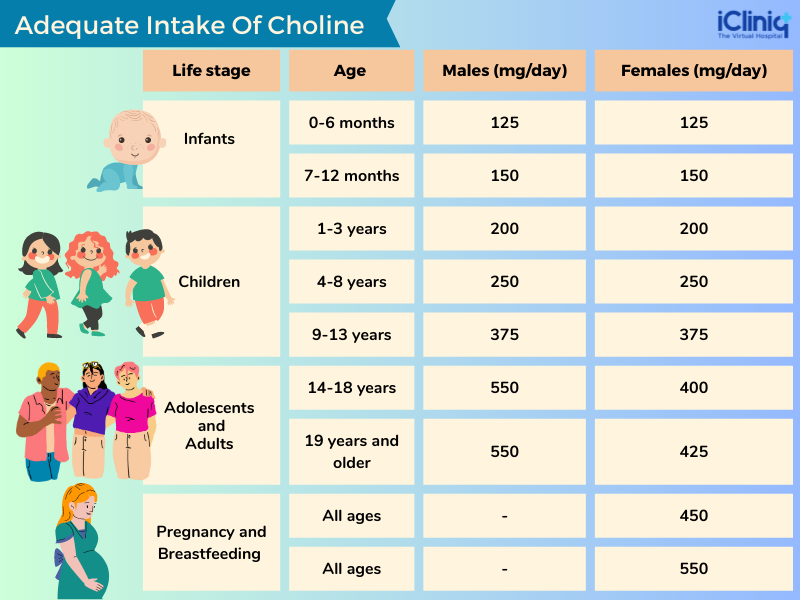What Is Choline?
Choline is an essential nutrient for the body and is made in the liver. It is also found in some foods and available as supplements. However, the liver's choline is insufficient to meet the body's needs. Choline is essential in different kinds of chemical reactions in the body. Choline is converted into Acetylcholine, a neurotransmitter that helps in muscle contraction, pain responses, and brain functions like memory and thinking. In the liver, choline is converted to phosphatidylcholine, which helps break down fat. Since the amount of choline produced in the liver is insufficient to achieve daily needs, it must be obtained from the diet.
What Are the Sources of Choline?
Many foods contain choline. The main sources are meat, fish, dairy products, poultry, and eggs. The following foods contain the highest levels of choline;
-
Chicken breast.
-
Beef.
-
Fish.
-
Egg yolks.
-
Milk.
-
Yogurt.
-
Legumes (peanuts, beans).
-
Potatoes.
-
Cruciferous vegetables like cauliflower, broccoli, cabbage, and Brussels sprouts.
-
Sunflower seeds.
Also, breast milk contains choline which is why it is added to baby foods. However, dietary choline is mostly consumed in the form of phosphatidylcholine.
Dietary Supplements:
Choline dietary supplements are available as choline alone or with some vitamins and minerals. The amount of choline in supplements is 10 mg (milligrams) to 250 mg. Choline in dietary supplements is in the form of phosphatidylcholine, choline bitartrate, or lecithin.
What Is the Daily Recommended Intake of Choline?
The adequate intake (AI) of choline for females above 19 years of age is 425 mg daily, and for males above 19 years of age is 550 mg daily. In pregnancy, AI is 450 mg daily, and in lactation, it is 550 mg daily.
Adequate Intake (AI) Of Choline

What Is Choline Toxicity?
Choline toxicity is rare and only occurs at higher doses well above the required daily intake. The dose of choline that leads to toxicity may vary according to age, sex, and overall health. However, a daily dose of more than 0.12 ounce can cause toxicity. Notably, these levels are significantly higher than the recommended daily intake of 550 mg for males and 425 mg for females. A high amount of ingestion of choline can lead to increased production of TMAO (Trimethylamine-N-Oxide), a substance associated with a high risk of cardiovascular disease. Intake of 10000 to 16000 mg of choline daily is associated with fishy body odor, vomiting, increased salivation, and sweating. Choline produces a metabolite called trimethylamine. In choline toxicity, this trimethylamine is produced and excreted in higher concentrations. This is considered to be the reason for fishy body odor. A daily intake of 7500 mg of choline is associated with lowering blood pressure, which causes fainting or dizziness. The tolerable upper intake level (UL) for choline is 3500 mg per day, per the Food and Nutrition Board (FNB) of the Institute of Medicine in the United States. The UL applies only to healthy individuals. For individuals with kidney diseases, liver diseases, inherited trimethylaminuria, Parkinson's disease, and depression, the tolerable upper intake level is lower than that of healthy individuals.
Age group:
-
Infants 0 to 12 months - Not possible to establish.
-
Children 1 to 8 years - 1000 UL (mg/day).
-
Children 9 to 13 years - 2000 UL (mg/day).
-
Adolescents 14 to 18 years - 3000 UL (mg/day).
-
Adults above 19 years - 3500 UL (mg/day).
What Are the Symptoms of Choline Toxicity?
Symptoms of choline toxicity vary according to the severity and duration of toxicity. The symptoms include;
-
Excessive sweating.
-
Vomiting.
-
Excessive salivation.
-
Low blood pressure.
-
Fishy body odor.
-
Nausea.
-
Abdominal cramps.
-
Liver damage.
-
Increased risk of bleeding.
-
Reduced appetite.
If someone experiences the symptoms of choline toxicity, they should seek medical attention immediately.
How to Manage Choline Toxicity?
If someone experiences choline toxicity, they should seek immediate medical help. Treatment of choline toxicity depends upon the severity of the symptoms. It may include supportive care to treat dehydration and electrolyte imbalances and medications to manage low blood pressure and vomiting. In severe cases, hospitalization must be necessary. It is important to stick to the recommended daily choline intake to prevent choline toxicity. If someone is considering taking choline supplements, it is important to take advice from a doctor to determine if it is necessary and to get guidance on the correct dosage. It is also important to read the labels of any dietary supplements and avoid taking more than the recommended amount.
What Is Choline Deficiency?
Choline deficiency is rare in healthy individuals because some amount of choline is produced in the body. Choline deficiency leads to liver damage, muscle damage, and non-alcoholic fatty liver disease (NAFLD or hepatosteatosis).
Who Is at High Risk of Choline Deficiency?
Pregnant Women:
Pregnant women consume less than the recommended daily choline intake because prenatal dietary supplements lack choline. In pregnancy, the adequate intake of choline is 450 mg daily.
Patients Fed Intravenously:
People who cannot digest solid foods with their digestive tract are fed through veins. This is called Total Parenteral Nutrition (TPN). Usually, choline is not involved in the TPN unless specified. Non-alcoholic fatty liver disease is seen in long-term TPN patients.
Individuals with Genetic Alterations:
Genetic mutations to the genes that control the metabolism of choline can cause choline deficiency.
Conclusion
Choline is an essential nutrient that is administered through foods and dietary supplements. Small amounts of choline are synthesized in the body also. Choline is important for many bodily functions like brain and muscle activities. Taking more than the recommended daily intake of choline leads to choline toxicity. And it can cause serious damage to the liver and other organs. So, it is important to follow the recommended dosage and consult a doctor when taking dietary choline supplements.












